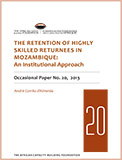
This research combines Institutional Rational Choice (IRC), the Institutional Analysis and Development (IAD) framework, Return Migration theories and International Development theories to understand how Mozambican highly skilled returnees (HSRs) interact with the institutional setting in the home country while pursuing their personal aspirations. Institutional setting in this context is defined as a multidimensional space of factors – institutions plus other contextual variables co-evolving as they interact with each other – in which HSRs try to mobilize resources over time towards their personal goals. Factors impose elements of order in the context where they operate and they affect the distribution of preferences, incentives, and outcomes. A better understanding of the constraints imposed by these factors/elements on HSRs’ behavior and personal satisfaction could allow governments in extremely poor countries to prioritize interventions for institutional development given the very scarce resources available. These could have the interacting effect of increasing the capacity of HSRs to contribute to the development of Mozambique and provide positive signals to encourage the return of more. Hypotheses around three specific types of factors/domains – professional opportunities, information and communication technologies (ICTs), and governmental programs – are tested. The methodology applied includes (i) a cross-sectional purposive sample of Mozambicans who recently returned to the homecountry after obtaining post-secondary education abroad; (ii) an online survey complemented with field interviews; (iii) bivariate analysis; and (iv) multivariate model-building. The results demonstrate, first, that all three factors tested are associated with retention. This finding supports the IAD’s argument that new policies and institutions can be devised to shape those other contextual variables. Second, this research demonstrates that the degree of this association differs across factors. Third, this research shows that the degree of association also differs from urban to rural settings. Moreover, the first and foremost role played by professional-related elements in the capacity of a country to retain some of its most well-educated citizens supports previous literature. Further, this research supports the argument that institutional development precedes economic development. Also, this research does not find empirical support for the hypothesis that Mozambique has been facing increasing levels of the brain drain. In addition, the “Satisfaction With Life Scale” (SWLS) proxy for retention is among all proxies tested the one mostly associated with the institutional setting in the home country. More specifically, the possibility of achieving personal goals is the most important component of one’s overall life satisfaction. Finally, there is a temporal “ripple-effect” on the association (i.e., progressively weaker) of the current institutional setting both with past and with the possibility of future behavior. The implications resulting from these findings are discussed and classified into three categories: (i) theoretical; (ii) practical for policy; and (iii) for future research.





